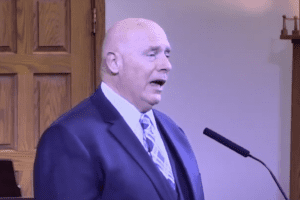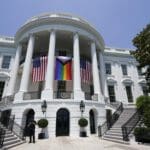Pastors claim LGBTQ anti-discrimination effort 'targets' them unfairly
A pastors group opposes a Michigan ballot initiative that would protect LGBTQ people from discrimination in housing, employment, and public accommodation.

Michigan Pastor’s Alliance, which describes itself as a “network of pastors and Christian leaders,” has come out against a petition drive initiative that would ensure LGBTQ are protected by a state anti-discrimination law.
If successful, the initiative would clarify that “sex” under the Michigan Elliott-Larsen Civil Rights Act of 1976 includes sexual orientation and gender identity or expression, so that trans and queer people would have stronger shields against discrimination in housing, employment, and public accommodation.
Trevor Thomas, co-chair and president of Fair and Equal Michigan, the ballot committee for the initiative, said, “Every Michigander should have an equal chance at success, without threat of being fired, harassed, or demoted just because the boss doesn’t like that they’re gay or transgender.”
But the pastors group claims the ballot proposal would promote religious discrimination.
Dr. R.B. Ouellette, pastor emeritus at First Baptist Church of Bridgeport, said, “Far from promoting fairness or equality, this initiative deliberately targets religious institutions and people of faith. It attempts to coerce them to violate deeply held faith-based beliefs.”
In the past, Ouellette has also tweeted, “Christians should stand for LGBT. (As long as LGBT stands for ‘Let God Be True.’)” and “I deeply appreciate our Presidents’ support of Religious Liberty.”
Fair and Equal Michigan said there is support for the anti-discrimination initiative from other faith leaders, however.
In January, a group convened in Grand Rapids, Michigan, to voice their support for the protections. Rev. Roland Stringfellow, a senior pastor and teacher of Metropolitan Community Church of Detroit; Reverend Rachel Bahr, pastor of Plymouth United Church of Christ in Grand Rapids; and Reverend Fred Wooden, senior minister of Fountain Street Church in downtown Grand Rapids were among the faith leaders who gathered to speak in favor of updates to the state’s civil rights law.
Bahr said she, her wife, and many members of her church who belong to the LGBTQ community deserve changes to the law.
“We really need to stand by and provide equal protections under the law for all people,” she told Michigan Radio.
The protections also have the support of Rev. Dr. Wendell Anthony, senior pastor of the Fellowship Chapel in Detroit. He is on Fair and Equal Michigan’s honorary leadership committee.
This is the first time that advocacy groups have tried this pathway to enacting these legal protections for LGBTQ people — instead of continuing to wait for more lawmakers who support changes to the law to enter the state Legislature.
They are currently trying to get 340,047 signatures for their petition drive. Then the legislature will have 40 days to adopt the measure or send this question to voters for the November ballot.
Although many ballot committees suspended their signature drives once social distancing began, Fair and Equal Michigan is moving forward by collecting electronic signatures instead of in-person signatures.
The Trump administration has frequently wielded the claim that nondiscrimination protections for LGBTQ people would damage religious freedom to roll back Obama administration regulations that included safeguards for LGBTQ people.
The Labor Department proposed a rule last summer that allows for broad religious exemptions for businesses that have federal contracts. LGBTQ advocacy groups have said that this will enable discrimination against workers, including pregnant workers and LGBTQ workers. At the time, the Labor Department said it would “provide the broadest protection of religious exercise recognized by the Constitution and other laws.”
In November, the U.S. Department of Health and Human Services proposed a rule that would remove Obama-era language that ensures protection against anti-LGBTQ discrimination in all of its grant programs. In its announcement of the rule, HUD said it would ensure that the federal government “not infringe on religious freedom in its operation of HHS grant programs.”
Published with permission of The American Independent Foundation.
Recommended

Alaska House committee advances, expands proposal to bar trans girls from girls sports
Amended bill would add elementary, middle school and collegiate sports to limits in place for high school
By Claire Stremple, Alaska Beacon - April 16, 2024
Bills targeting trans people are on the rise nationwide and in Alaska — most focus on children
House committee advances legislation that would restrict the rights of Alaska trans kids
By Claire Stremple, Alaska Beacon - April 01, 2024
Anti-abortion, anti-LGBTQ resolutions to be voted on at state Republican convention
A resolution to be considered by North Dakota Republican Party delegates at their upcoming convention would define life as beginning at fertilization and call for criminal penalties for “anyone who kills a pre-born human being.”
By Michael Achterling, North Dakota Monitor - March 26, 2024










































































